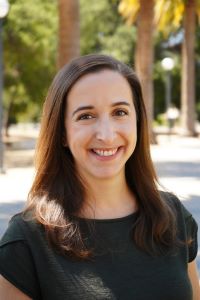Flexible encoding of goals in the brain’s cognitive map
Neuroscience Futures Seminar Series
| When |
May 8, 2024
4 p.m. to 5 p.m.

Marielena Sosa, Ph.D. Positive experiences must be remembered strongly to reinforce rewarding behaviors, and these memories must be able to update when knowledge of reward changes. How does the brain flexibly amplify memories of rewarding experiences while maintaining a stable representation of the external world? Using two-photon calcium imaging in mice, our work demonstrates that the hippocampus simultaneously represents the spatial environment and the animal’s position relative to reward in dissociable population codes. Notably, the code for experience relative to reward becomes stronger over learning as additional neurons are recruited to this representation. This work provides insight into how separate hippocampal ensembles may flexibly encode the most behaviorally relevant aspects of experience. Dr. Mari Sosa is a postdoctoral scholar in Neurobiology in the laboratory of Dr. Lisa Giocomo at Stanford University. Her current research focuses on the neural dynamics of spatial navigation and reward memory. She earned her PhD in Neuroscience with Dr. Loren Frank at the University of California, San Francisco, supported by an F31 graduate fellowship from the NIMH. In her PhD work, Dr. Sosa used multi-region electrophysiology in behaving rats to study interactions between brain areas during spatial reward learning, uncovering how separate neuronal networks may store specific elements of experience. As a postdoc, Dr. Sosa applies large-scale neural recording techniques in the hippocampus and entorhinal cortex of rodents to investigate how neural circuits amplify rewarding memories. For this work, she was awarded a Helen Hay Whitney Foundation postdoctoral fellowship in 2021 and was named a Leading Edge Fellow in 2023. Her future research goal is to understand how changing physiological and behavioral demands shape the information retained in memory. |
|---|---|
| Where |
Campus:
Building:
3232 SW Research Drive
Portland,
Oregon
97239
M1441
|
| Contact Information |

Marielena Sosa, Ph.D.
Postdoctoral Scholar, Neurobiology
Stanford Univerity
Positive experiences must be remembered strongly to reinforce rewarding behaviors, and these memories must be able to update when knowledge of reward changes. How does the brain flexibly amplify memories of rewarding experiences while maintaining a stable representation of the external world? Using two-photon calcium imaging in mice, our work demonstrates that the hippocampus simultaneously represents the spatial environment and the animal’s position relative to reward in dissociable population codes. Notably, the code for experience relative to reward becomes stronger over learning as additional neurons are recruited to this representation. This work provides insight into how separate hippocampal ensembles may flexibly encode the most behaviorally relevant aspects of experience.
Dr. Mari Sosa is a postdoctoral scholar in Neurobiology in the laboratory of Dr. Lisa Giocomo at Stanford University. Her current research focuses on the neural dynamics of spatial navigation and reward memory. She earned her PhD in Neuroscience with Dr. Loren Frank at the University of California, San Francisco, supported by an F31 graduate fellowship from the NIMH. In her PhD work, Dr. Sosa used multi-region electrophysiology in behaving rats to study interactions between brain areas during spatial reward learning, uncovering how separate neuronal networks may store specific elements of experience. As a postdoc, Dr. Sosa applies large-scale neural recording techniques in the hippocampus and entorhinal cortex of rodents to investigate how neural circuits amplify rewarding memories. For this work, she was awarded a Helen Hay Whitney Foundation postdoctoral fellowship in 2021 and was named a Leading Edge Fellow in 2023. Her future research goal is to understand how changing physiological and behavioral demands shape the information retained in memory.